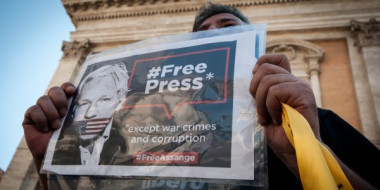U.S. Official Hints at Possible Plea Deal for Julian Assange ( theintercept.com )
Excerpt:
The United States is considering a plea deal that would allow WikiLeaks founder and whistleblower Julian Assange to return to Australia, the Sydney Morning Herald reported Monday.
U.S. Ambassador to Australia Caroline Kennedy told the Morning Herald that there could be a “resolution” to Assange’s now-four-year detention in Britain. Assange, an Australian citizen, has been held in a London prison since 2019 while combating U.S. extradition efforts. He faces 18 criminal charges in the U.S., 17 of which allege violations of the Espionage Act.
